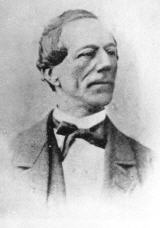father - more
Dehon's relationship with his father Jules Alexandre Dehon (27.3.1814-11.2.1882), a deep and tender affection, in part, is often marked by conflicts and a mutual lack of understanding. In the first lines of Dehon's Memoirs the different development of both men becomes clear:
"My father didn't have the opportunity for a complete Christian education.. From his family education he received a sense of impartiality and that goodness characterized him during his entire life. He lost the practice of Christian life during his high school (college) years, however he retained respect and appreciation for the religion." (NHV I/4r)
Jules Dehon belonged to the generation in France who for the first time, and in a most effective way through public education, were dechristianized. Following the contemporary understanding of the father's role, Jules Dehon regards his son's upbringing as a family matter and as his personal affair. In a letter to the director of the seminary Santa Chiara in Rome this becomes extremely clear:
"I require that Leo receives ordination as late as possible and only after a decision is made by the family." (letter of 22.3.1867 to P. Freyd).
The entire vocational development of Leo Dehon is a field of endless disputes, e.g. as Leo for the first time threatens "to appear at La Capelle in ecclesiastical habit;" the same incomprehension when Dehon establishes St. Jean and the congregation, and by this act puts an end to his father's dreams of his son becoming a bishop..
Apart from these difficulties the point should not be forgotten that the father's resistance also matured the son's decision for priesthood. Leo Dehon had a long life tender affection for his father which was probably deeper than the mentioned difficulties. That’s how we have to read what Leo Dehon writes on the occasion of his father’s death:
“My poor father was an example of faith and charity to the end. He consoled all of us and hid his sufferings from us. He received communion on Thursday. Yesterday he received extreme unction. Up to the final moment he had been gentle, affable, and patient. He gave us a very moving farewell. He said, ‘I am going with the confidence that my sons will guard the honor of my name.’ He said that in such a dignified way while extending his two hands toward us. He made his sacrifice with great generosity. He said, ‘I love you dearly, but I am happy to go to see God.’ The blessing of God was palpable around that funeral bed.” (Letter 2.12.1882)
